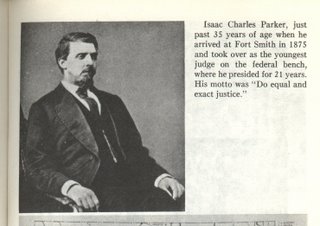A historical note of interest.
 (photo credit Glenn Shirley, Law West of Fort Smith (1968 ed.)
(photo credit Glenn Shirley, Law West of Fort Smith (1968 ed.)The motto of this blog is a quote from Judge Isaac Parker:
"Do equal and exact justice."
For those of you who are not familiar with Judge Parker, he was the presiding judge of the Western District of Arkansas and he sat on the bench at Fort Smith from 1875 to 1896. His jurisdiction extended into Indian Territory, and in those days that region was a nest of unrepentant banditti who used the remote territory as a refuge from the reach of the law and a place to practice the rule of the gun and the knife, and to satisfy themselves on the populace. Judge Parker is known for having sentenced nearly a hundred men to death on the gallows in the courtyard of the military installation at the end of Garrison Street, but he also conducted many criminal trials and was supported in the work of bringing law and order to the frontier by as fearless a group of men as any who wore the badge and packed a Colt.
Judge Parker was born in Ohio in 1838 to a modest family of farmers. He read the law, and hung out his shingle in St. Joseph, Missouri after being admitted to the Ohio bar in 1859. A Union man through and through, Judge Parker's loyalty to the Great Cause was rewarded through a number of important appointments and he served as a Representative in the U.S. Congress before he was appointed to the post in the Western District of Arkansas by President Grant. He served ably for many years.
There are two excellent books about the Judge and his Court, They are, Law West of Fort Smith by Glenn Shirley, and Hell On the Border by S.W. Harman.
